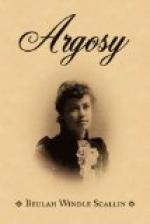my individuality in her own, the gradual elimination
from my life of all its colour and freshness.
She strove earnestly, and with infinite patience,
to change me from a dreamy, passionate child—a
child full of strange wild moods, capricious, and
yet easily touched either to laughter or tears—into
a prim and elegant young lady, colourless and formal,
and of the most orthodox boarding-school pattern; and
if she did not quite succeed in the attempt, the fault,
such as it was, must be set down to my obstinate disposition
and not to any lack of effort on the part of Miss
Chinfeather. And now this powerful influence had
vanished from my life, from the world itself, as swiftly
and silently as a snowflake in the sun. The grasp
of the hard but not unkindly hand, that had held me
so firmly in the narrow groove in which it wished me
to move, had been suddenly relaxed, and everything
around me seemed tottering to its fall. Three
nights ago Miss Chinfeather had retired to rest, as
well, to all appearance, and as cheerful as ever she
had been; next morning she had been found dead in
bed. This was what they told us pupils; but so
great was the awe in which I held the mistress of Park
Hill Seminary that I could not conceive of Death even
as venturing to behave disrespectfully towards her.
I pictured him in my girlish fancy as knocking at
her chamber door in the middle of the night, and after
apologising for the interruption, asking whether she
was ready to accompany him. Then would she who
was thus addressed arise, and wrap an ample robe about
her, and place her hand with solemn sweetness in that
of the Great Captain, and the two would pass out together
into the starlit night, and Miss Chinfeather would
be seen of mortal eyes nevermore.
Such was the picture that had haunted my brain for
two days and as many nights, while I wandered forlorn
through house and playground, or lay awake on my little
bed. I had said farewell to one pupil after another
till all were gone, and the riddle which I had been
putting to myself continually for the last forty-eight
hours had now been solved for me by Mrs. Whitehead,
and I had been told that I too was going home.
“To the care of Lady Chillington, Deepley Walls,
Midlandshire.” The words repeated themselves
again and again in my brain, and became a greater
puzzle with every repetition. I had never to my
knowledge heard of either the person or the place.
I knew nothing of one or the other. I only knew
that my heart thrilled strangely at the mention of
the word Home; that unbidden tears started
to my eyes at the thought that perhaps—only
perhaps—in that as yet unknown place there
might be someone who would love me just a little.
“Father—Mother.” I spoke
the words, but they sounded unreal to me, and as if
uttered by another. I spoke them again, holding
out my arms and crying aloud. All my heart seemed
to go out in the cry, but only the hollow winds answered
me as they piped mournfully through the yellowing
leaves, a throng of which went rustling down the walk
as though stirred by the footsteps of a ghost.
Then my eyes grew blind with tears and I wept silently
for a time as if my heart would break.




